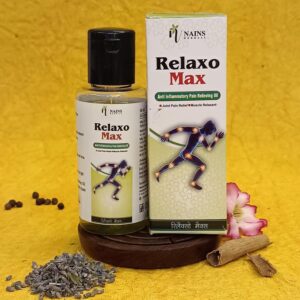Top 7 Benefits of Using Herbal Pain Relief Oil Daily In 2025
Introduction:
- I’ve spent years researching and recommending natural therapies, and I’ve seen amazing outcomes with herbal pain relief oils, particularly for people who are dealing with joint problems, muscle discomfort, or soreness after working out.
- Time-tested herbs like eucalyptus, turmeric, camphor, and wintergreen—known for their anti-inflammatory and pain-relieving qualities in Ayurveda and contemporary herbal medicine—are used to make herbal oils.
- Herbal Pain Relief Oil provide a non-invasive, non-chemical substitute for synthetic painkillers, and they are backed by millennia of Ayurvedic practice as well as new clinical research.
- Herbal oils are thought to be safe for everyday use and appropriate for all age groups (when used carefully), in contrast to over-the-counter pain relievers that frequently induce negative effects with prolonged usage.
- The top 7 advantages of using herbal pain relief oil on a daily basis are listed in this piece, along with an explanation of each benefit based on practical experience, conventional wisdom, and therapeutic insights.

1. Natural Pain Relief Without Side Effects
- Risk-Free Real-World Healing:
- Many people use painkillers because they have persistent pain.
- Although they provide short-term comfort, painkillers frequently cause adverse consequences, such as liver damage and acidity.
- Herbal oils for pain reduction offer a natural, safe solution free of negative side effects.
- Regular usage of herbal oils at home has resulted in long-term relief for users.

- Backed by Ayurveda and Modern Wellness Science:
- Ayurvedic concepts and contemporary medicinal understanding are used in the formulation of herbal oils.
- Important components:
- Turmeric (curcumin-containing, anti-inflammatory)
- Camphor (pain relief and nerve ending numbing)
- Eucalyptus oil (reduces stiffness and increases blood flow)
- Together, oils can naturally relax muscles, lessen edema, and ease discomfort.
- Physiotherapists and wellness specialists recommend it for mild to severe pain.
- Reliable by Herbalists and Medical Professionals:
- acknowledged in integrative and conventional medical procedures.
- being utilized more often in health and physiotherapy facilities.
- backed by clinical studies that demonstrate its anti-inflammatory properties.
- manufactured by reputable, dermatologist-tested, and FDA-approved brands.
- devoid of artificial additives, harsh chemicals, and parabens.

- An effective, safe, and side-effect-free remedy is provided by herbal pain treatment oils.
- They make a great daily or long-term substitute for painkillers.
- supported by science and tradition, and trusted by users.
2. Reduces Joint and Muscle Inflammation

- Genuine Pain Relief from Daily Aches:
- Post-workout pain, joint stiffness, and muscular tightness are common.
- Herbal Pain Relief Oil When applied to afflicted areas, herbal pain oils provide noticeable alleviation.
- Frequent users claim better mobility, less swelling, and a faster recovery from sprains.
- trusted for everyday comfort by sportsmen, the elderly, and persons with arthritis.
- Herbs That Reduce Inflammation and Promote Natural Healing:
- Ingredients that are known to lower inflammation are used in the formulation of herbal oils:
- Neem Oil: Joint inflammation is reduced by neem oil’s antibacterial and anti-inflammatory qualities.
- Castor Oil: which lowers pain and swelling, is found in castor oil.
- Turmeric: Addresses the underlying causes of both exterior and interior inflammation.
- wintergreen oil: Methyl salicylate, which functions similarly to aspirin, is found naturally in wintergreen oil.
- For long-lasting relief, the combination deeply penetrates the muscles and joints.

- Supported by Current Research and Ayurvedic Wisdom:
- These oils are recommended by Ayurveda for long-term ailments like sciatica, spondylitis, and arthritis.
- The anti-inflammatory properties of castor, turmeric, and neem oils are supported by recent research.
- Used and suggested by practitioners of alternative medicine, naturopathy clinics, and wellness centers.
- To guarantee effectiveness and purity, brands frequently adhere to GMP (Good Manufacturing Practices).
- Non-toxic, safe, and simple to use:
- Devoid of parabens, artificial perfumes, and steroids.
- It is safe for long-term use and doesn’t cause rebound discomfort or reliance.
- It doesn’t burn or irritate the skin.
- For relief from joint pain, stiffness, or swelling, apply two to three times a day.
3. Improves Blood Circulation
- Experience the Relief and Warmth Immediately:
- After using herbal oil, users frequently experience a calming feeling of lightness and warmth.
- Frequent use increases vitality and lessens arm and leg heaviness.
- Particularly helpful for those who lead sedentary lives or suffer from cold hands and feet.
- encourages quicker recuperation following physical activity or exercise.

- Ingredients That Promote Healthy Circulation:
- The following substances are added to herbal oils to improve blood flow:
- Eucalyptus oil: improves circulation by dilating blood vessels.
- Camphor: Heats up the skin and activates nerve endings.
- peppermint oil: Menthol, which is included in peppermint oil, helps to relax muscles and improve blood flow.
- Ginger oil: is well-known for its warming properties and ability to improve blood flow.
- These components help improve the supply of nutrients and oxygen to muscular tissues.
- Encouraged by Holistic and Conventional Therapies:
- Using herbal oils, traditional Ayurvedic massage (Abhyanga) aims to increase circulation.
- Regular oil massages are advised by therapists and physiotherapists to improve blood flow and lymphatic drainage.
- Topical oils have been shown to enhance muscle rehabilitation and peripheral circulation.
- utilized in spas, wellness centers, and senior citizen and athlete recuperation regimens.
- Non-invasive, efficient, and clean:
- Only exterior application-no internal drugs or adverse effects.
- aids in the natural reduction of chilly extremities, cramping, and numbness.
- created with safe, everyday-use, plant-based components.
- Combines well with steam therapy or a light massage.
4. Relaxes Body and Mind
- You Feel Calm Immediately:
- Within minutes of receiving a massage, frequent users describe a calming, soothing impact.
- eases back, shoulder, and neck tension and aids in relaxation after a hard day.
- advantageous for people who are restless, anxious, or under a lot of stress.
- improves mood, emotional equilibrium, and general mental clarity.

- Essential Oils for Nerve Relief:
- Calming essential oils like these are frequently found in herbal pain treatment oils:
- Lavender oil: is well-known for its calming properties, which lower anxiety and encourage serenity.
- Peppermint oil: relieves mental exhaustion and revitalizes the senses.
- Basil & Vetiver Oils: of vetiver and basil promote deep tissue comfort and relaxation.
- Ashwagandha Extract: When administered topically, ashwagandha extract is an adaptogen that regulates stress hormones.
- These oils soothe the central nervous system and ease tight muscles.
- Used in Ayurvedic Medicine and Aromatherapy:
- extensively utilized in Ayurvedic massages, spa treatments, and aromatherapy.
- In order to regulate Vata (the air element), which is connected to stress and anxiety, Ayurveda places a strong emphasis on using essential oils.
- For stress alleviation, topical application of lavender and peppermint oil is frequently advised by holistic therapists and sleep specialists.
- acknowledged for their contribution to fostering emotional stability and mental health.
- Non-Habit Forming, Natural, and Gentle:
- It is entirely plant-based and free of dangerous chemicals and artificial perfumes.
- non-addictive substitute for sleeping aids or stress relievers with chemical bases.
- For improved sleep, apply to the feet, neck, or temples before bed.
- Even for sensitive skin types, it is safe to use every day.
5. Supports Better Sleep

- Restful Sleep Without Turning and Tossing:
- Users who have stiffness or physical pain frequently have trouble falling or staying asleep.
- Before going to bed, applying a herbal pain reliever reduces stress and encourages deeper sleep.
- Perfect for people who suffer from restless legs syndrome, back pain, or joint pain.
- Frequent use at night promotes natural relaxation without the need for drugs.
- Herbal Components That Encourage Sound Sleep:
- Important components with a reputation for improving sleep include:
- Lavender Oil: Enhances the quality of sleep and soothes the nervous system.
- Chamomile Oil: Reduces symptoms of insomnia and eases anxiety.
- Wintergreen and camphor oils: might ease tense muscles that could keep you from falling asleep.
- Ashwagandha & Vetiver: Natural adaptogens that aid in the body’s relaxation include vetiver and ashwagandha.
- Together, these oils help lessen both physical and emotional discomfort at night.
- Suggested by Therapists and Wellness Experts:
- For improved sleep hygiene, topical oils are advised by ayurvedic physicians and sleep therapists.
- used to get the body ready for sleep during nighttime body massages (Abhyanga).
- Clinical research backs up the usage of chamomile and lavender oils to enhance the quality of sleep.
- For deep relaxation, a natural, non-invasive approach is employed in aromatherapy and spa treatments.
6. Helps Manage Chronic Pain Conditions
- Handling Chronic Pain Of course:
- Herbal oils are helpful for people with long-term ailments like sciatica, spondylitis, and arthritis.
- With regular use, users report increased everyday mobility and a progressive decrease in pain severity.
- In order to prevent unwanted effects and dependency, many people choose herbal oils over long-term medicines.
- reduces joint and spine stiffness and discomfort, which enhances quality of life.

- Strong Components for the Treatment of Chronic Pain:
- Important components of herbal oils that aid in the treatment of chronic pain include:
- Turmeric: is a potent anti-inflammatory that reduces inflammation in chronic joints.
- Castor and neem oils: help to calm inflamed tissues and reduce swelling.
- Wintergreen and Camphor Oils: of wintergreen and camphor have analgesic properties that are comparable to those of topical painkillers.
- Ashwagandha: Promotes nerve health and helps lower inflammation.
- These oils work deeply to ease the nerve pain and muscular spasms that come with long-term illnesses.
- Supported by Pain and Ayurvedic Experts:
- Herbal oils have long been suggested by Ayurvedic medicine as a treatment for persistent musculoskeletal disorders.
- Their analgesic and anti-inflammatory qualities are supported by current research.
- often used in conjunction with rehabilitation and physical therapy to provide a comprehensive treatment.
- acknowledged by practitioners of alternative medicine as a secure supplemental treatment for chronic pain.
- Safe for Extended Use with No Negative Side Effects:
- Steroids and artificial compounds that might harm tissues over time are absent from herbal oils.
- When taken as prescribed, it is safe for sensitive skin and non-addictive.
- It can be used consistently every day for months or even years to control symptoms.
- offers a natural method of pain relief that promotes the general health of the joints and nerves.
7. Enhances Mobility and Flexibility

- Feel More Comfortable and Agile Each Day:
- Following a daily massage with herbal oils, regular users report better joint mobility and reduced stiffness.
- facilitates easier, painless physical activity and aids in the reduction of muscle tension.
- advantageous for athletes, the elderly, and those who lead sedentary lives.
- promotes steady motion and lowers the chance of cramps or injury.
- Important Components That Promote Joint Health:
- Compounds found in herbal oils aid in joint lubrication and flexibility:
- Ginger Oil: Improves blood flow and relaxes tense muscles with ginger oil.
- Peppermint and eucalyptus oils: provide a cooling impact that helps muscles relax.
- Turmeric: Promotes cartilage health and lowers inflammation.
- Ashwagandha: Strengthens muscles and lessens weariness.
- These components complement one another to keep joints and muscles flexible and supple.
- Encouraged by Current Research and Conventional Practices:
- Herbal oils have long been utilized in Ayurvedic treatments to increase joint flexibility and mobility.
- To preserve range of motion, physiotherapists advise oil massage as a component of therapy.
- Regular topical application improves joint lubrication and reduces stiffness, according to clinical evidence.
- widely used in yoga, sports rehabilitation regimes, and wellness regimens.

- Effective and Safe for Everyday Use:
- It is non-toxic and devoid of synthetic chemicals or steroids that might cause long-term joint damage.
- When used as prescribed, it is safe for people of all ages and skin types.
- readily integrated into regular massage or self-care regimens.
- maintains healthy, pain-free muscles and joints by offering natural, gentle support.
FAQS
1. How does herbal pain relief oil work?
Herbal pain relief oils work by penetrating deep into the skin and muscles to reduce inflammation, improve blood circulation, and soothe pain using natural ingredients like turmeric, camphor, and eucalyptus.
2. Is herbal oil safe for daily use?
Yes, most herbal oils are made from natural ingredients and are safe for daily use. They are free from harmful chemicals and do not have side effects like oral painkillers.
3. Can herbal oil help with chronic conditions like arthritis or sciatica?
Absolutely. Consistent use of herbal oils can help manage chronic conditions like arthritis, spondylitis, and sciatica by reducing pain, swelling, and stiffness.
4. How should I apply herbal pain relief oil?
Apply a few drops of oil to the affected area and gently massage it in circular motions until absorbed. Use 2–3 times a day or as recommended.
5. How long does it take to feel relief after applying the oil?
Most users experience relief within 10–15 minutes of application, especially when combined with a warm compress or light massage.
6. Can I use herbal oil along with other medications or treatments?
Yes, herbal oils can be safely used alongside other treatments unless your doctor advises otherwise. Always consult your healthcare provider for chronic conditions.
7. Are herbal oils suitable for sensitive skin?
Most herbal oils are gentle and suitable for all skin types. However, it’s best to do a patch test before first use, especially if you have sensitive skin or allergies.
9. Can pregnant women or elderly people use herbal oils?
Yes, but it is recommended to consult a healthcare professional before use during pregnancy or for elderly individuals with underlying health conditions.
10. Is there any difference between Ayurvedic and regular herbal pain oils?
Ayurvedic oils are based on ancient formulations and may include unique herbs and preparation methods. Both types can be effective, but Ayurvedic oils focus more on holistic healing.
